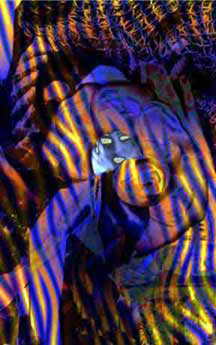 "Oriental Finding" by Cecil Herring |
| by Tracy Delaney "The Holy Spirit will come upon you, and the power of the Most High will overshadow you." (Luke 1:35). WHEN WE ARE told that Mary was a virgin, we tend to infer that when the Holy Spirit did come upon her, she did not come too. Virgin birth, whether you accept it literally or not, is a pervasive mythological symbol. Egyptian, Persian, Greek, Christian and other mythologies all have miraculously conceived Sacred Children born of virgins, or at least born without sex. The idea pops up independently in different cultures, which suggests it's an important relic of our collective unconscious. For example, in Persia, one version of Mithra's birth was that he was born on 25th December after the union of the Sun God with his Mother. In common with the Christian myth there was controversy as to whether his Mother was literally a mortal virgin. In the Greek Dionysian tradition, the mortal Semele was impregnated by a love potion made from the heart of the dead child Dionysus, given to her by the god Zeus. In Egypt Isis conceived her child, Horus, using an artificial phallus after the death of her consort Osiris. His body had been cut into fourteen pieces, and while she found thirteen of them, a fish ate his phallus when it was thrown into the river Nile. Since Isis is a Goddess, she doesn't technically count, but her story again refers to a woman reproducing by herself. It illustrates the creative principle, and the fact that there is a blur as to where virgin birth ends and creation myth begins. Both deal with the concept of creating something from nothing or at least in the apparent absence of its constituent parts. Birth is probably the most spectacular creative act humans can perform, and so is creation for the Gods. Virgin birth lies somewhere in between. There is a continuum. There are Gods incarnating as humans via divine impregnation of mortal women. These are fairly clear-cut virgin birth scenarios. Next there are the cases of Gods and Goddesses reproducing by themselves, like Isis. Then too are the creation myths where the first entity appears from nowhere, i.e., creates itself. It all comes down to, "Where do we come from?" The Sacred Child, who is most often male, usually lives out a version of the Hero myth (humble birth, superhuman feats, dragon slaying, pride, and fall), that we all have to do symbolically as we grow up. It's not too difficult to see the relevance of the hero myth in our lives, but why virgin birth? Most of us are first taught the idea of virgin birth through nativity stories. At such a young age, we have no idea what virgin actually means, so it's difficult to look at the concept with fresh eyes later on. How would we react if we first heard about virgin birth as adults, fully understanding that it's an oxymoron? It could be almost Zen-like. Maybe one hand clapping is the Zen equivalent. If we look at it in that light, forgetting whether and how this can actually happen and accepting the futility of applying logical thought to the problem, we can try to feel it on a deeper level, which is where all archetypes and symbols come from. After all that's what mythology is for. So a woman, without having sex with a man, conceives and bears a child. What do we get from that? Well on a superficial level there's the idea that science can't explain everything, miracles happen, God can do stuff. The notion of virgin birth is deep in our collective psyche, and miraculous conception is an overtly sexual metaphor for communion with the divine. It's a reminder that everything you need is already in you. Something sacred, that Hero, you can create by yourself. Just you and the life force. Sacred sex for one, is a beautiful image of Self giving birth to Self, the Sacred Child within. Imagine Isis with her dildo. In Ancient Egyptian mythology, the whole of creation arose from masturbation; this was clearly identified as the source of the birth of the Self, and was a form of group worship. At the beginning of creation, in the absence of anyone to reproduce with it also seems a logical solution. Pyramid texts from around 2040 BC state, "Atum gives birth to himself through masturbation at Heliopolis." He then proceeds to create the twins Shu and Tefnut from his semen. Before Atum (which means both all and nothing) there was only Nun (the void). Ancient Egyptian mythology is often thought to be the original foundation for all the Western spiritual traditions. Virgin birth as masturbation, I'm not sure it's quite what Luke had in mind, not consciously anyway. Although, "The power of the Most High will overshadow you" sounds like a fair description of orgasm. But it's a beautiful image. Far from something being absent from the equation, as it first seems, it's the image of wholeness just as you are. So before you can live out your Hero myth, you have to create the Hero. You have to stop scaling mountains and slaying dragons now and then, and take some time to nourish yourself. Now that really would be a miracle wouldn't it? Maybe that's why it's a myth.++ |
|
|